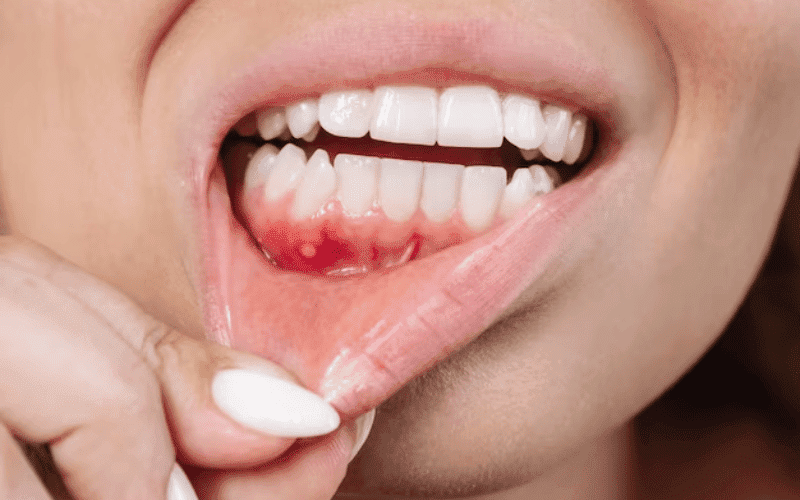Introduction to periodontitis
Periodontitis is an advanced stage of gum disease characterized by inflammation and infection that damages the soft tissues and bone supporting the teeth. Caused primarily by poor oral hygiene, it leads to gum recession, pocket formation between teeth and gums, and eventual tooth loss if left untreated.
Symptoms include swollen gums, persistent bad breath, and bleeding while brushing. Risk factors include smoking, genetic predisposition, and certain medical conditions. Early intervention through professional cleaning, improved oral hygiene, and lifestyle changes can manage periodontitis, preventing further damage and preserving oral health. Treatment may involve scaling, root planing, antibiotics, or surgical intervention in severe cases.
What causes periodontitis?
Periodontitis is primarily caused by plaque buildup, a sticky film of bacteria that forms on teeth. When plaque isn’t adequately removed by regular brushing and flossing, it hardens into tartar (calculus), providing a surface for more bacteria to thrive.
This leads to inflammation in the gums (gingivitis), causing them to pull away from the teeth and form pockets where more bacteria accumulate. Over time, the body’s immune response to these bacteria and their toxins damages the gums and surrounding bone, resulting in the progression of periodontitis.
Other contributing factors include smoking, genetic predisposition, certain medications, hormonal changes, systemic diseases, and poor nutrition.
Signs and symptoms
1. Gum Recession: Periodontitis often leads to the gums pulling away from the teeth, creating pockets or gaps between the teeth and gums.
2. Bleeding Gums: Frequent bleeding while brushing or flossing or even spontaneously indicates potential gum inflammation and disease.
3. Persistent Bad Breath: Also known as halitosis, it can be a symptom of periodontitis due to bacterial buildup in the mouth.
4. Loose or Shifting Teeth: As periodontitis progresses, the supporting bone and tissues weaken, causing teeth to loosen or change position.
5. Gum Sensitivity and Discomfort: Tender, swollen, or painful gums, especially while eating or touching the gums, can signify gum disease and periodontitis.
Diagnosis and treatment options
Diagnosis:
1. Dental Examination: Dentists assess the gums, measure pocket depths, and check for gum recession, plaque buildup, and signs of inflammation.
2. X-rays: These help visualize bone loss and assess the extent of damage beneath the gum line.
3. Periodontal Probing: Dentists use a probe to measure pocket depths around the teeth, evaluating the severity of periodontitis.
Treatment Options:
1. Scaling and Root Planing: Deep cleaning to remove plaque and tartar from above and below the gum line, smoothening root surfaces to prevent bacterial reattachment.
2. Antibiotics: Prescribed to control infection, either as pills, mouth rins, or gels. In severe cases, surgical interventions like flap surgery, bone or tissue grafts, or guided tissue regeneration may be necessary to restore damaged tissues and bone. Regular professional cleanings and improved oral hygiene are crucial for managing and preventing the progression of periodontitis.
Prevention tips for periodontitis
1. Maintain Excellent Oral Hygiene: Brush teeth at least twice a day and floss daily to remove plaque and prevent its buildup, which is crucial in preventing gum disease.
2. Regular Dental Check-ups: Visit the dentist for routine cleanings and check-ups every six months, or as recommended, to detect early signs of gum disease.
3. Healthy Lifestyle Habits: Avoid smoking, as it significantly increases the risk of periodontitis. Maintain a balanced diet and limit sugary foods contributing to plaque formation.
4. Use Fluoride Products: Fluoride toothpaste and mouthwash strengthen teeth and prevent decay, supporting overall gum health.
5. Manage Health Conditions: Control systemic conditions like diabetes, as uncontrolled diabetes can increase the risk of developing and worsening periodontitis. Regular exercise and a balanced diet aid overall health and may positively impact gum health.
The link between periodontitis and overall health
Periodontitis has a significant association with overall health, impacting various systemic conditions. Research suggests links between periodontitis and:
1. Heart Disease: Periodontitis may increase the risk of heart disease and stroke. Inflammation from gum disease can affect the cardiovascular system, potentially contributing to artery narrowing and blood vessel complications.
2. Diabetes: Periodontitis can make it harder to control blood sugar levels in individuals with diabetes. Conversely, uncontrolled diabetes can worsen gum disease.
3. Respiratory Issues: Bacteria from periodontitis can be aspirated into the lungs, potentially leading to respiratory infections, pneumonia, or exacerbating existing lung conditions.
4. Pregnancy Complications: Periodontitis might contribute to premature birth and low birth weight. Pregnant individuals with gum disease may have a higher risk of complications.
5. Inflammatory Conditions: Periodontitis is an inflammatory disease and might exacerbate other inflammatory conditions like rheumatoid arthritis and may also impact conditions such as Alzheimer’s disease and certain cancers.
While these associations exist, more research is needed to fully understand the extent and mechanisms of how periodontitis affects overall health. Proper oral hygiene and regular dental check-ups are vital for oral health and for reducing risks associated with these systemic conditions.
In conclusion, periodontitis, stemming from poor oral hygiene and bacterial buildup, poses significant risks to oral health and overall well-being. Its links to heart disease, diabetes, and other systemic conditions emphasize the importance of preventive measures and timely treatment.
Seeking professional care such as Periodontal Treatment is crucial. Missouri City Dentist – Excel Dental offers comprehensive dental services, including periodontal treatments, emphasizing the necessity of regular check-ups and maintaining excellent oral hygiene.
By prioritizing oral health with reputable dental services like Excel Dental, individuals can mitigate the risks associated with periodontitis and promote their overall health and well-being.


